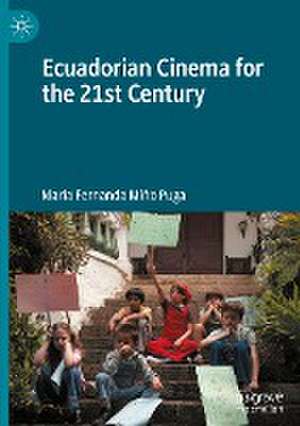Ecuadorian Cinema for the 21st Century
Autor María Fernanda Miño Pugaen Limba Engleză Hardback – 14 oct 2023
Preț: 715.05 lei
Preț vechi: 872.01 lei
-18% Nou
Puncte Express: 1073
Preț estimativ în valută:
136.91€ • 142.56$ • 113.59£
136.91€ • 142.56$ • 113.59£
Carte tipărită la comandă
Livrare economică 14-28 februarie
Preluare comenzi: 021 569.72.76
Specificații
ISBN-13: 9783031409882
ISBN-10: 3031409884
Ilustrații: XIII, 222 p. 16 illus.
Dimensiuni: 148 x 210 mm
Greutate: 0.44 kg
Ediția:1st ed. 2023
Editura: Springer Nature Switzerland
Colecția Palgrave Macmillan
Locul publicării:Cham, Switzerland
ISBN-10: 3031409884
Ilustrații: XIII, 222 p. 16 illus.
Dimensiuni: 148 x 210 mm
Greutate: 0.44 kg
Ediția:1st ed. 2023
Editura: Springer Nature Switzerland
Colecția Palgrave Macmillan
Locul publicării:Cham, Switzerland
Cuprins
Introduction.- Chapter 1: The case for an Ecuadorian cinema for the 21st century.- Chapter 2: The commercially released narrative feature during the Ley de cine years.- Chapter 3: Ecuador’s vernacular cinema: underground, popular, and neoliberal?.- Chapter 4: Cinema and Ecuador’s Buen Vivir: negotiating coloniality in the community.- Chapter 5: Making sense of the past: documentary and memory in Ecuadorian cinema for the 21st century.- Conclusion.
Notă biografică
Dr María Fernanda Miño Puga is an Associate Lecturer at the University of St Andrews, Department of Film Studies, UK. She specialises in contemporary Ecuadorian cinema and indigenous film and media, with previous publications on documentary and collective memory. She holds a PhD from the University of Saint Andrews and this is her first monograph
Textul de pe ultima copertă
Ecuadorian cinema has been largely overlooked in film scholarship, usually being limited to brief descriptions in Latin American compendiums. Ecuadorian cinema for the 21st century would be the first major publication in English to fill this gap. It provides a thorough account of film activities during the new millennium, while also referring to the country’s previous film history. Specifically, this book discusses the so-called ‘mini-boom” in Ecuadorian cinema, and its relation to industry structures, film policy, and the context of Socialism for the 21st century, hence the chosen terminology of “Ecuadorian cinema for the 21st century”. What makes this project distinctive, aside from the originality of its content, is its transdisciplinary methodology. As a means to frame the textual analysis of selected films, this book discusses theories on national cinemas, memory, political ideology, and production practices, in an interdisciplinary approach that can be emulated in later projects. For this purpose, the book is divided into five chapters, in addition to a brief introduction and conclusion. Each chapter relies on specific case studies to discuss local narratives and documentaries, whether state sponsored or privately funded, centring primarily on films that premiered in commercial theatres between 2006 and 2016.
Dr María Fernanda Miño Puga is an Associate Lecturer at the University of St Andrews, Department of Film Studies, UK. She specialises in contemporary Ecuadorian cinema and indigenous film and media, with previous publications on documentary and collective memory. She holds a PhD from the University of Saint Andrews and this is her first monograph
Caracteristici
First major English publication on Ecuadorian Cinema Convincing and well-evidenced case for the contradictory nature of film policy and national cinemas in Latin America An invaluable resource for students and scholars of Ecuadorian Cinema of or beyond the 21st century
